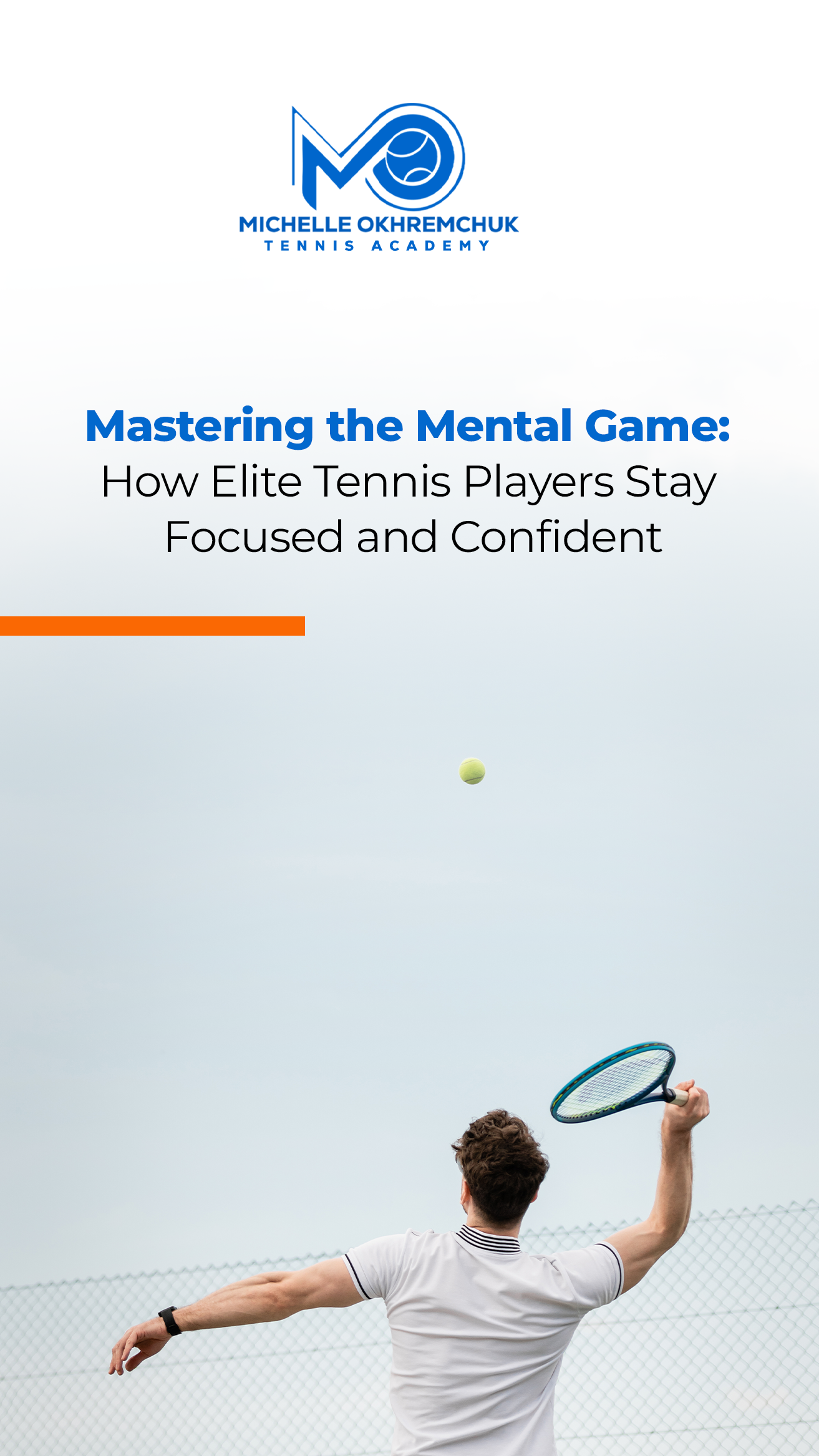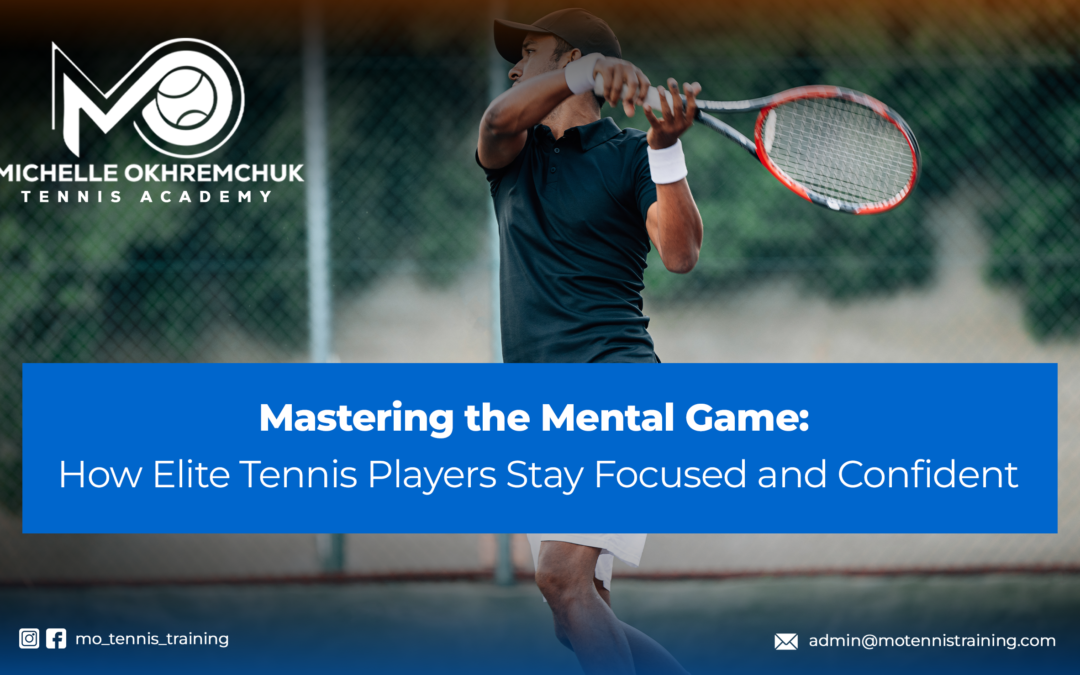Welcome to a deep dive into the mental arena of tennis, where champions are forged by solid mental fortitude. In elite tennis, mastering the mental game is the secret weapon that separates the great from the exceptional.
Picture this: You step onto the court confidently and determined. Your shots are crisp, your movements fluid and victory seems within reach. But then, the pressure mounts, mistakes creep in, and suddenly, the game slips through your fingers like grains of sand.
Tennis is a battlefield where the mind reigns supreme, where the ability to stay focused, confident, and composed can make or break a match. Whether you’re a seasoned pro or a novice, understanding the nuances of mental toughness is the key to unlocking your full potential on the court.
In this blog post, we’ll explore the inner workings of the mental game, uncovering the strategies and techniques that elite tennis players employ to stay laser-focused and unshakably confident in the face of adversity.
From overcoming self-imposed obstacles to embracing the power of a point-by-point mindset, we’ll delve into the mindset shifts that can help improve your game.
The Importance of Mental Toughness in Tennis
Tennis is not just a physical sport; it’s a mental game. The ability to stay focused and maintain composure in high-pressure situations can often be the deciding factor between victory and defeat. That’s where mental toughness comes into play. This inner strength allows elite tennis players to perform at their best, even when facing adversity.
The importance of mental toughness cannot be overstated in tennis. When faced with challenging opponents, grueling matches, or unexpected setbacks, this resilience enables players to stay calm and make strategic decisions under pressure. Without mental toughness, even the most talented athletes can crumble under stress.
One key aspect of mental toughness is maintaining a laser-like focus on the court. In an environment filled with distractions – cheering crowds, opponents’ mind games, or even our own self-doubt – top players have honed strategies for staying locked in on their game plan. They develop pre-match rituals and routines that help them enter a state of intense concentration before stepping onto the court.
Another vital component of mental toughness is mindset shifts during challenging moments.
Elite tennis players understand the importance of remaining positive and confident despite setbacks or mistakes during a match. Instead of dwelling on missed shots or bad calls from officials, they quickly reset their minds and focus on what needs to be done next.
Strategies for Maintaining Focus on the Court
In elite tennis, maintaining focus on the court is crucial. With so much happening during a match – from opponents trying to outplay you, to distractions in the audience or even your thoughts and emotions – staying focused can be challenging. However, top tennis players have developed effective strategies to keep their concentration intact throughout the game.
One key strategy is establishing pre-match rituals and routines. These can help athletes create a sense of familiarity and calm before stepping onto the court. Whether it’s listening to a specific playlist, doing warm-up exercises in a particular order, or visualizing success beforehand, these rituals prepare players mentally and physically for optimal performance.
Another vital strategy involves mindset shifts during challenging moments. Elite tennis players understand that setbacks are part of the game, but allowing them to derail their focus is not an option.
A. Pre-match rituals and routines
Pre-match rituals and routines play a crucial role in helping elite tennis players prepare mentally for their matches. These rituals are unique to each player and can vary from simple warm-up exercises to specific visualization techniques.
One common pre-match ritual is the physical warm-up, which involves stretching exercises and light aerobic activities to get the body ready for action. This helps prevent injuries and serves as a mental cue that it’s time to focus on the upcoming match.
Another critical aspect of pre-match preparation is mental imagery or visualization. Players often visualize themselves executing successful shots, moving fluidly on the court, and winning key points. This technique helps them build confidence and familiarize themselves with different scenarios they may encounter during the match.
Some players engage in relaxation techniques such as deep breathing or meditation before stepping onto the court. These practices help calm nerves, reduce stress levels, and promote a clear mind for optimal performance.
Establishing a routine before each match can provide a sense of familiarity and control over one’s environment. Whether it’s listening to music, organizing equipment in a particular way, or following specific superstitions, these routines help create stability amid an unpredictable sport.
B. Mindset shifts during challenging moments
When the pressure is on, and the game hangs in the balance, elite tennis players know how to make crucial mindset shifts that can turn the tide in their favor. These mental adjustments are key to staying focused and confident when faced with challenging moments on the court.
One common strategy used by top players is to embrace a positive mindset. Instead of dwelling on mistakes or setbacks, they quickly shift their focus to finding solutions and opportunities for improvement. This proactive approach helps them maintain clarity and composure during high-pressure situations.
Another important mindset shift is learning from adversity. Rather than getting discouraged by losses or errors, elite players use these experiences as valuable learning opportunities. They analyze what went wrong, identify areas for growth, and develop strategies to overcome similar challenges in future matches.
Top tennis players understand the power of self-belief. They have unwavering confidence in their abilities and trust their training and preparation. By maintaining a strong belief in themselves even when facing difficult opponents or unfavorable circumstances, they are able to perform at their best under any conditions.
Elite athletes practice mindfulness during challenging moments. They stay present-focused rather than allowing negative thoughts or distractions to derail their performance. Mindfulness techniques such as deep breathing exercises help them stay calm and centered amidst intense competition.
Building Confidence and Overcoming Doubts
Confidence is a key factor in tennis success. It allows players to perform at their best, even in high-pressure situations. But what happens when doubts start creeping in? How can elite tennis players build confidence and overcome those moments of uncertainty?
One powerful technique is visualization. By mentally rehearsing successful shots and victories, players can create a positive image of themselves on the court. They see themselves executing flawless serves, making precise volleys, and winning important points. This visualization helps instill belief in their abilities and boosts their overall confidence.
Positive self-talk is another effective strategy for building confidence. Instead of focusing on mistakes or shortcomings, players use affirmations to reinforce positive thoughts about their skills and potential. They tell themselves phrases like “I am strong,” “I am capable,” or “I have what it takes.” These affirmations help shift their mindset from doubt to self-assurance.
In addition to visualization and positive self-talk, elite tennis players also work on developing mental resilience. They understand that setbacks are part of the game but choose not to let them define their performance or impact their confidence levels negatively.
Instead of dwelling on past failures or missed opportunities, these athletes focus on learning from them as valuable lessons for improvement. By adopting this growth mindset approach, they turn doubts into stepping stones towards greater success.
Handling Pressure and Managing Stress
Pressure and stress are inevitable in the competitive world of elite tennis. The ability to handle these challenges effectively can separate the champions from the rest. So, how do top tennis players stay composed when faced with high-pressure situations?
One strategy is to focus on deep breathing techniques. Players can calm their nervous system and regain control over their emotions by taking slow, deliberate breaths. This simple yet powerful technique helps them stay present in the moment and make clear-headed decisions.
Another helpful approach is to break down the match into smaller, manageable goals. Instead of getting overwhelmed by the magnitude of the situation, players set specific targets for each point or game. This keeps them focused and boosts their confidence as they achieve these mini-goals along the way.
Developing a strong support network can be instrumental in handling stress effectively. Players who have a reliable team behind them—coaches, trainers, sports psychologists—can lean on them for guidance during challenging times.
It’s crucial for athletes to prioritize self-care off-court as well. Engaging in activities that promote relaxation, such as yoga or meditation, can help reduce overall stress levels and improve mental resilience.
By implementing these strategies consistently, tennis players can enhance their ability to handle pressure gracefully while staying mentally strong throughout matches.
Conclusion
Mastering the mental game is an essential component for elite tennis players seeking to excel on the court. The importance of mental toughness cannot be overstated, as it allows athletes to stay focused and confident even in the face of adversity.
Tennis players can enhance their mental performance through various strategies such as pre-match rituals, mindset shifts, visualization techniques, positive self-talk, and managing stress effectively.
Maintaining focus on the court starts with establishing pre-match rituals and routines. Whether it’s a specific warm-up routine or listening to music that pumps them up before a match, these habits help players get into the right frame of mind for competition.
Implementing mindset shifts during challenging moments enables athletes to overcome negative thoughts and regain focus quickly.
Handling pressure gracefully is another skill that separates elite tennis players from others. By learning how to manage stress effectively through deep breathing exercises or mindfulness practices like meditation or yoga, athletes can stay calm in high-pressure situations.


